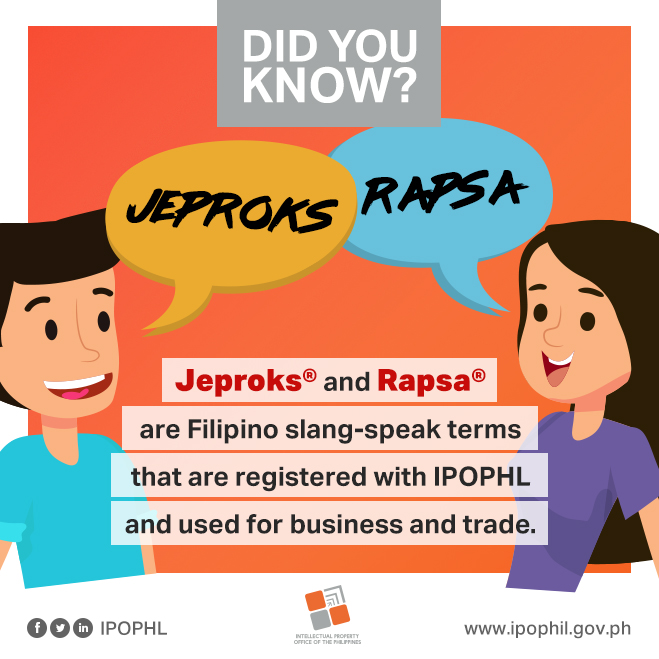Trademarked Slang
07 August 2018

English may be the universal language, but in terms of diversity, it doesn’t hold a candle to the Filipino tongue. Just for the single English word, “rice”, Filipinos have several variations: kanin,bigas,palay, and sinaing. If we include Filipino slang - sub-culture language like gay lingo, ‘street’ talk, and ‘jejemon’-speak to name a few, the richness of the Filipino imagination in communicating shines through.
So inventive are these words that they’ve even managed to be registered as trademarks at the Intellectual Property Office of the Philippines (IPOPHL) . Trademarks are evaluated heavily on distinctiveness because they should be able to differentiate the goods and services of one enterprise from that of another’s.
You might be asking, but how is Filipino slang distinctive, isn’t it already part of common, everyday use? Trademarks have to be strictly distinct by being an arbitrary word - that is unrelated to the business or industry it operates in. (Apple Inc. is distinct in computers, but is not distinct in an apple fruit distribution or harvesting industry).
Registrable trademarks may also be ‘suggestive marks’ - telling something about the quality and characteristics of a product, but don't convey the message directly.
Filipino slang, at least those registered at IPOPHL, is so uniquely fluid that they can be considered either suggestive or arbitrary.
Here are two Filipino slang-speak terms that have been registered at the IPOPHL, and can be used for business and trade
1. Jeproks
A slang term older than the internet, jeproks would be a familiar term for millennials’ ermat or erpat but will most likely evoke a look of confusion from your more bagets relatives. Popularised by rocker Mike Hanopol in the 70s, jeproks refers to laid-back, easy-going young man with connotations of being spoiled. This is surprising as the word is a reversal of the word “projects” or, specifically a person who grew up in state housing projects. How and why Splash Foods Corporation chose this as a trademark for their seasoning products, we still don’t know but hey it’s catchy
“Jeproks” by Splash Foods Corporation
for seasonings in the form of granules, liquid, and powder preparations or formats
for canned meals prepared from fish; dried fish
2. Rapsa
Yet another example of “Baliktad Tagalog”, rapsa is perhaps the most popular slang term in this list used for business, particularly in the food and beverage sector. More than a handful of cafes, bar and grills, and online foodstuff stores have taken this on as a business name and perhaps its ubiquity has discouraged registering it as a trademark. Nonetheless, Centennial Food Corp. got the jump among competitors in its line of business, and managed to register Rapsa specifically for its noodle product
“Rapsa” by Centennial Food Corp.
registered in 2011
for noodles
Filipino creativity and ingenuity guarantees the local language will keep evolving and enterprising individuals will be ready to capitalise these as trademarks for business.



